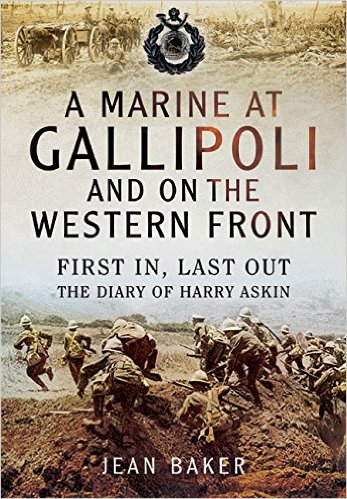Yet another diary/memoiremerges from the Great War’s attic. Our main character, twenty-two year old Yorkshire lad, Harry Askin, joined the Royal Marines, Portsmouth Battalion, at Nottingham in September 1914. This is a detailed and well-written diarythat makes for an entertaining read.
The bookhas it all, a young lad volunteers at the start of the war, he goes out to Gallipoli and experiences all that the campaign has to offer, wounds, thirst, sickness, combat and then the evacuation. Askin was one of the last men to leave in January 1916. He is then sent to Mudros, to Salonika and then to the grim mud, bullets, shellfire and trenches of the Western Front. Askin soldiers on from the Ancre to Arras, gets wounded again, recovers and goes into the trenches in the Ypres Salient. As he goes through the warAskin progresses through the NCO ranks and gets sent home in October 1917 to train as an officer. As I often think at this point in similar memoirs, this sojourn to become a ‘temporary gentleman’ possibly saved his life. Anyone who had been in the ‘mob’ this long, from fourteen to seventeen, with long spells in the front line, was living on borrowed time.
Unfortunately there is little said about his training as an officer. Askin made it back to his battalion, to command his old platoon just after the Armistice. Here,sadly,the diary comes to a rather ragged and abrupt end as it either runs out of steam or the editors decided that the war was over and so was the book.
Askin makes no attempt to hide his contempt of those he considered shirkers and as he called them, “swingers of the lead”. If the diary is to be believed he not only made his feelings known in writing but made them known verbally at the time. Askin describes how these men and old, unfit NCOs who had disappeared from the Gallipoli peninsula, returned to the battalion, resuming their old jobs and ways at Mudros, after the evacuation. Askin is clear that those who had gone through the fighting in the trenches at Gallipoli had little time for those who had feigned illness and worse to get away. Morale in the battalion after the evacuation does not appear to have been high and the return of these men cannot have helped the situation.
In fact morale is something of a recurrent theme in the book. If he was naturally pessimistic and using his diary to have a good old therapeutic moan or if it is a genuine record of the morale of the marines in his battalion it is not entirely clear. Marines and soldiers do like to have a good old ‘drip’ from time to time so the truth is probably somewhere in between. The main issues for Askin on the Ancre in 1916/17, beyond the mud, fighting and shellfire were cold, hunger and low morale. I found myself struggling to read through the Battle of the Ancre, not because it was badly written but because, like the whole Somme Campaign, it was relentless. This is the Ancre seen from the trenches not as seen from Divisional HQ or from the lofty distance of the Official History. There is nowhere to hide, even for the reader, you either have to go through the Battle of the Ancre or give up. He has written about it so well that one can understand, despite Askin’s loathing of shirkers, the desire of men to just get away and hide.
Like some of the newly emerging diaries of the Great War thisonehas been worked on and amended after the conflict ended.He has added statistics that would not have been available to him as an ordinary marine at the time and Askin’sweary, post war bitterness certainly does show through. He comments upon those who, post war, refuse to work for their countryand is scathing about Britain as a place fit for heroes to live in. I do wonder how much Askin re-wrote and edited his text after the war and in which decade he did so. That said, if Askin did edit and re-write part of his diary after the war’s end (which he has obviously done) he would not have been the first serviceman to do so…
This is a straightforward personal diary, an archetypal war story, edited post war with more than a hint of bitterness and it’s a good read. If you are a regular reader of Great War memoirs and diaries then you will know what to expect of this book:Muck and bullets! For the devotee of the Gallipoli Campaign or of the Western Front, or the Royal Naval Division there is plenty of detail and information to keep you interested and it is well worth seeking out.
Reviewed by Dr Wayne Osborne for War History Online. Wayne’s latest book ‘Suvla 15’ is available from Salient Books at www.salientbooks.co.uk
A MARINE AT GALLIPOLI AND ON THE WESTERN FRONT
First In, Last Out.
The Diary of Harry Askin
By Harry Askin. Edited by Jean Baker, Gaynor Newlyn and Nicola Woollaston.
Published by Pen & Sword Ltd, 2015.
Hardback, 248 pages.
ISBN 978 1 47382 784 4
